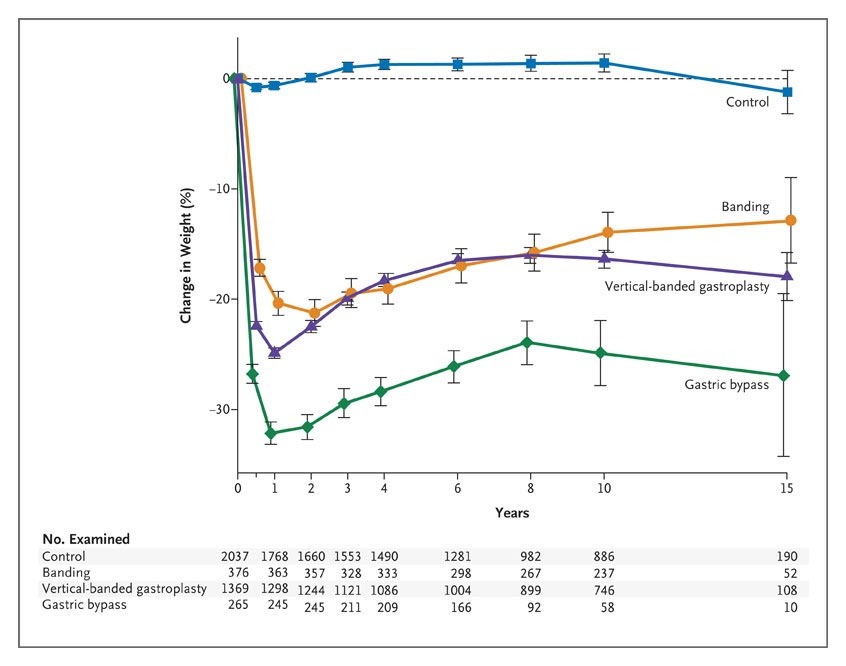 In my quest for information, I kept coming across “The Swedish Obesity Study” (SOS) as a much cited research study supporting the benefits of Bariatric Surgery.
In my quest for information, I kept coming across “The Swedish Obesity Study” (SOS) as a much cited research study supporting the benefits of Bariatric Surgery.
The primary aim of the SOS was to examine whether (i) bariatric surgery and (ii) weight loss induced by bariatric surgery are associated with lower mortality compared with the death rates during conventional treatment.
The initial study (which commenced in January 1987) included just over 4000 participants with approximately 2000 subjects going on to have Bariatric Surgery, and 2000 as a “control” who used conventional weight loss treatments (diet, exercise, counselling). There were followups with participants after 2 years and 10 years.
Results
The average weight change in control subjects was less than +/-2% during the period of up to 15 years during which weights were recorded. Maximum weight losses in the surgical subgroups were observed after 1 to 2 years: gastric bypass, 32%; vertical-banded gastroplasty, 25%; and banding, 20%. After 10 years, the weight losses from baseline were stabilized at 25%, 16%, and 14%, respectively. There were 129 deaths in the control group and 101 deaths in the surgery group.
After two years, the weight had increased by 0.1 percent in the control group and had decreased by 23.4 percent in the surgery group (P<0.001). After 10 years, the weight had increased by 1.6 percent and decreased by 16.1 percent, respectively.
Conclusions
As compared with conventional therapy, bariatric surgery appears to be a viable option for the treatment of severe obesity, resulting in long-term weight loss and improved lifestyle. Weight reductions achieved in the surgical group reduced the two year incidence of diabetes 32 times as compared to the controls, and after eight years there was still a 5-fold reduction in diabetes incidence.
Graph
The graph below shows % change in weight for each group over time. There is a clear and significant weight reduction of particiants undergoing Baritric Surgery over those who don’t, and of the three different types of surgery included in this study, the Gastric Bypass is significantly more effective.

My Own Observations/Comments
Here are some of my own interpretations/concerns regarding the data :
- The number of participants in the 15 year followup for Gastric Bypass (10) represents just 3% of the original participants (265) so I wonder about the statistical significance of this result… however overall the total number 15 year followups for Bariatric Surgery (170) represents 7% of the original group… and the trend for improved bypass data is consistent throughout the 15 year period.
(9% of the control group were assessed after 15 years) - The gastric Bypass operation included in this study is almost certainly the original Roux-en-Y procedure, whereas more recently the Mini-Gastric-Bypass procedure has become more popular. This is considered a faster, safer and at least as effective option.
